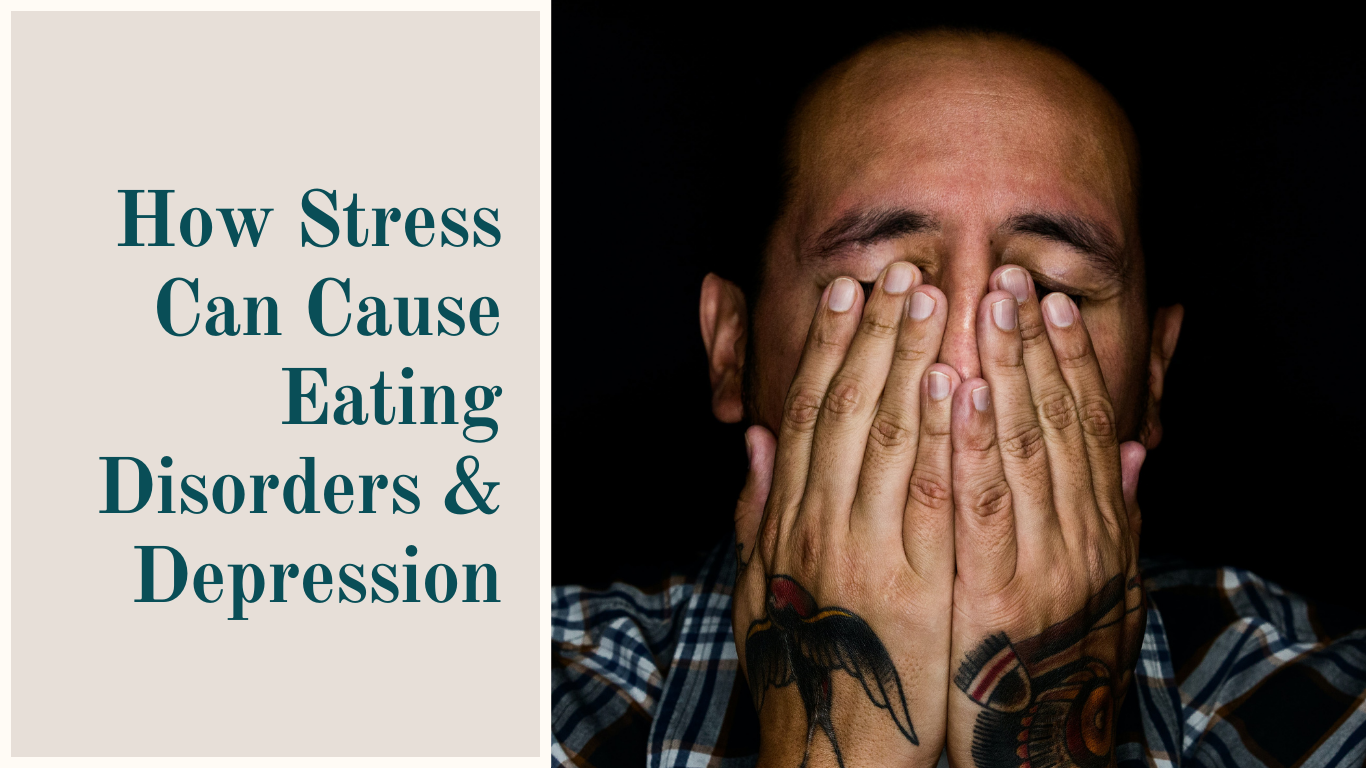How Stress Can Cause Eating Disorders and Depression
Stress has unfortunately become a part of the world's everyday life. According to the American Institute Of Stress, 94% of workers feel stressed at work, and the number of stressed individuals out of 143 countries worldwide is 35%. These numbers may not weigh heavy on us at first glance, but it is crucial to remember that stress has detrimental effects on our mental and physical health.
It has become so common that hearing "stress" often no longer instills a sense of alarm. Stress can have a powerful influence on our minds and bodies, leading us to behave in ways that can be harmful. With stress come various physical health issues and mental health disorders. Yes, stress can cause eating disorders and depression.
What Is Stress?
The World Health Organization defines stress as any type of change that causes physical, emotional, or psychological strain. It is our body's response to things that need our attention or action, like going to work, performing at school, or studying for an exam.
Stress can be good, such as eustress, which encourages us to take on a challenge and feel rewarded when we accomplish it. However, stress is mostly bad, causing negativity that can sap our energy and make us feel overwhelmed, weakening our mental health.
Causes of Stress
Stress can come from anywhere in this world where people have to hustle to survive. Add in the presence of stressors like unrealistic job expectations, financial stress, difficult relationships with family or peers, and other problems that come with life. Here are some of the common stressors that anyone can encounter:
Unhappiness in our jobs
Too many responsibilities
Long working hours
Discrimination and harassment
Death of a loved one
Divorce
Financial obligations
Marriage
Moving to a new place
Illnesses and injuries
Traumatic events
Caring for a sick family member or friend
Conflicts with family, friends, or coworkers
Unhealthy relationship
There is really no end to the list of stressors. In fact, anything and everything can be a cause of stress! Stress also differs from person to person. What may seem like a stressor for one person may not be stress-inducing for another.
Signs and Symptoms
Stressors can create a cascade of physical and mental disorders. Stress manifests in various physical symptoms, such as the following:
Mood swings
Insomnia
Headache
Low energy
Decreased sex drive
Digestive problems
Gastrointestinal problems
Physical pains
Tension in the muscles, especially the neck, and shoulders
Frequent sickness
Grinding teeth
Racing heartbeat
It is important to know that signs and symptoms of stress may also differ from person to person. Some people show they are stressed through physical signs, while others experience stress as more of an emotional issue. Generally, signs of stress can be psychological, emotional, physical, and behavioral.
What Happens to You When You Are Stressed?
Stress can make our hearts pound, our palms sweaty, and our bodies tense. Stress actually triggers your body's fight-or-flight response. It causes the release of hormones like adrenaline and cortisol, or the stress hormone, which speeds up your heart rate and slows your digestion. It also shunts blood flow, which leads to changes in other autonomic nervous functions.
Once your acute stress is gone, your systems return to normal function. However, if it’s chronic stress or episodic acute stress, the body remains in a heightened state, causing physical and mental health issues ranging from mild to severe.
Eating Disorder
A common result of stress is an eating disorder, which can have serious physical and emotional repercussions. The National Eating Disorders Collaboration defines eating disorders as complex and life-threatening mental illnesses. They are disturbances in behaviors, thoughts, and attitudes toward food, eating, weight, and body shape. ANAD said that eating disorders affect at least 9% of the world's population.
Types of Eating Disorders
Many types of eating disorders affect people of all ages and genders. Here are the most common:
Anorexia nervosa: An obsessive fear of gaining weight, leading to extreme calorie restriction.
Bulimia nervosa: An obsession with food and its consumption, resulting in binge eating and purging.
Binge eating disorder: Eating a significantly large amount of food in a short period without compensating through purging or fasting.
Pica: Eating unusual substances without nutritional value, like dirt, paint, chalk, or even ice.
Rumination disorder: A newly-defined eating disorder where people chew their food and spit it out or regurgitate it after meals.
Avoidant/restrictive food intake disorder: Refusing to eat certain food groups due to an emotional or sensory issue.
Causes of Eating Disorders
Various factors contribute to eating disorders. Family history, stress, trauma, and the desire to meet cultural standards of beauty are all potential causes. Mental health issues such as anxiety and major depression can also lead to abnormal eating habits.
Signs and Symptoms
Generally, we need more studies to understand the causes of eating disorders better. And like stress, they can manifest differently in different people. Some of the mental, behavioral, and physical severe symptoms include the following:
Dramatic weight loss
Preoccupation with body weight and food
Eating in secrecy
Avoiding social situations involving food
Digestive problems
Intense fear of weight gain or loss
Binge-eating and purging
Excessive exercising
Severely limiting, restricting, or refusing the amount and types of food
Atypical lab test results and thyroid problems
Sleep problems
Irregular menstruation
Difficulty concentrating
Dry skin
Brittle nails
Thinning hair
Weakness of muscles
Poor immune system function
Calluses across the tops of the finger joints could also be a sign of induced vomiting because of a purging disorder.
Depression
Another stress-related condition is depression. It is a mental health disorder affecting our thoughts, feelings, and acts. According to the WHO, about 5% of adults worldwide suffer from depression, and it is the leading cause of disability, contributing majorly to the overall global burden of disease. Depression causes feelings of sadness, leading to various problems that decrease the ability to function.
According to the National Institute of Mental Health, some types of depression include persistent depressive disorder, severe depression, clinical depression, perinatal and postpartum depression, seasonal affective disorder, and major depression. Persistent depressive disorder is one of the most common types, which is having depression that lasts for two years or longer.
Causes of Depression
Depression, also called major depressive disorder, differs from sadness or grief. It is a serious illness that needs treatment. It involves brain chemicals, and when symptoms occur, it can involve a major depressive episode. Causes of depression can include the following:
Abuse
Age
Certain medications
Conflict
Death or a loss
Environmental factors
Gender
Genes
Major events
Personal problems
Medical conditions such as premenstrual dysphoric disorder and attention deficit hyperactivity disorder
Health conditions such as heart disease
Substance misuse
Older adults and more women experience depression than men, although depression affects people of all genders and ages. It can be mild, moderate, or severe, and people experiencing depression often need medication, psychotherapy or talk therapy, electroconvulsive therapy (ECT), and other treatments.
Signs and Symptoms
The signs and symptoms of depression are perhaps the most challenging to recognize. People may think that they are just sad, while in reality, they have signs of depression. Moreover, some people with depression also seem completely functional or, at the very least, appear to be able to fake being fine.
Generally, the common symptoms of depression include the following:
Feeling sad
Loss of interest in activities once enjoyed
Low self-esteem
Weight gain or loss without dieting
Insomnia
Too much sleeping
Loss of energy
Increase in purposeless physical activity or slowed movements or speech
Feeling worthless
Difficulty in focusing
Thoughts of death
Suicide attempts
Depression has already taken many people's lives, with some not knowing they had the condition. It also leads to more mental disorders, such as anxiety disorder, mood disorder, and bipolar disorder, which the National Institute of Mental Health described as experiencing manic episodes or unusually elevated moods.
The Link Between Stress, Eating Disorders, and Depression
Stress has been directly linked to the risk factors for mental illnesses like depression. However, there is no clear correlation between stress and eating disorders. Nevertheless, stress has been proposed as a possible cause of eating disorders since stress can lead to depression, which leads to a change in appetite. A person with an eating disorder often has symptoms of stress and depression.
Unsurprisingly, chronic stress leaves people feeling helpless and vulnerable, causing depression and other disorders. And those feelings may bring about stress-induced behaviors, such as overeating or undereating, that lead to an eating disorder. When stressed, some people rely on food for comfort or as a stress reliever, making them feel guilty and even more stressed afterward. Conversely, stress can also lead to decreased appetite and weight loss.
How To Healthily Manage Stress
Ultimately, stress is the common denominator between eating disorders and depression. Moreover, both stress and eating disorders can lead to depression. It is a vicious cycle that we need to break! The best way to do this is through stress management, emotional support, and healthy lifestyle choices.
Mental Health Breaks
A few minutes of pause and peace can help fight stress in daily life. It’s best to take a break and do something calming, such as taking a walk or meditating. Listening to music, reading, and spending time with loved ones can help reduce stress and improve emotional health.
Physical Exercise
Physical activities like jogging, swimming, biking, and yoga can help reduce stress. Exercise is a great stress reliever and can help improve physical health. Also, exercising releases endorphins, hormones that make people feel good.
Balanced Diet
Eating a balanced and nutritious diet helps improve mood and overall health. Eating plenty of fruits and vegetables, lean proteins, whole grains, nuts, seeds, and legumes is important for managing stress. Avoiding processed foods and sugary drinks can also help reduce stress levels.
Healthy Sleeping Habits
Quality sleep can significantly affect stress levels and how people feel during the day. Getting at least seven hours of sleep every night helps improve stress levels and emotional well-being.
Social Support
Having a strong support system is vital for stress management. Talking to trusted friends and family can help relieve stress and provide emotional support. It is also ideal to seek treatment from professionals if stress and depression become overwhelming.
Thrive With Thrive Nutrition
Do we wait until stress takes a toll on our well-being to take action, or is it better to recognize it and take preventative measures? At Thrive Nutrition, we believe it is better to be proactive and take preventive measures, especially when it comes to stress management.
Stress is normal, but it should not stop us from taking care of ourselves. Before stress can cause a medical condition, lead to depressive disorders, or affect our bodily functions, explore all the healthy treatment options until you find the effective treatments for you. Good nutrition can reduce symptoms and risk factors, giving your body coping skills to end the vicious cycle!
As a medicine nutrition professional, I provide tailored nutrition plans to help you manage stress better and improve overall health and well-being. You can also get personalized nutrition advice to ensure that stress does not lead to more emotional and physical problems.
Thrive Nutrition has treatment options that help reduce stress, the risk of depression, and depressive symptoms through healthy practices. Talk to us today!



